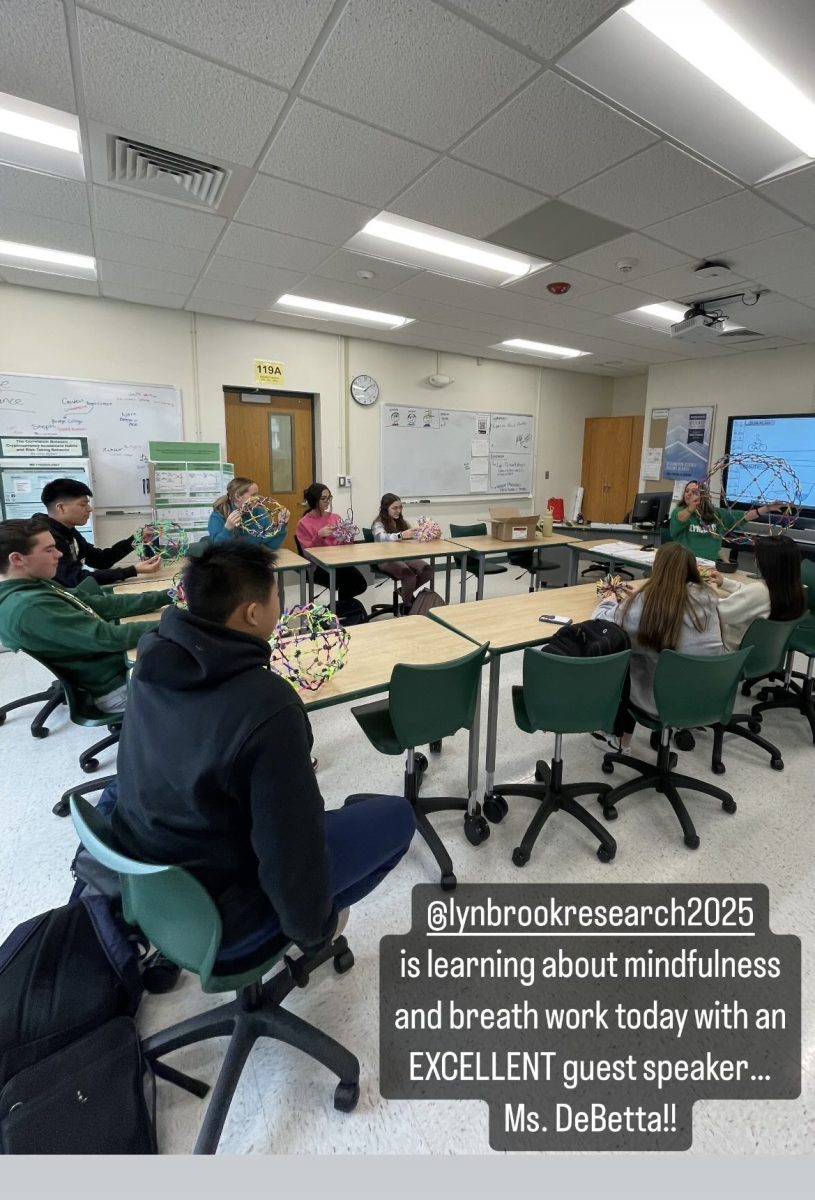To culminate the year, the junior science research students practiced mindfulness with yoga and mindfulness teacher Deborah Debetta in December. During the workshops, the junior Research students learned various mindfulness techniques from DeBetta in order to reduce their stress levels. Science research teacher Kathleen McAuley explained how, “The point of these workshops is to teach our juniors (who, let’s be honest, are typically the most stressed-out grade of high school) techniques to help them manage their stress levels. We can’t make stress go away, and a little bit of stress is sometimes healthy, but there is an incredible amount of anxiety and stress that goes along with junior year of high school. So, learning about the signs of an unhealthy level of stress will hopefully help you all manage going forward.”
Junior Simon Yu agreed: “These workshops aimed to reduce stress from what would arguably be the most stressed group of students in LHS, the junior research class. Through these workshops, we aimed to reduce stress and relax the body.”
Primarily, between the two days of the workshop, the students learned breathing techniques and the science behind mindfulness. Day 1 of the workshop (Dec. 1) included the science aspect of mindfulness and a breathing lesson. DeBetta explained, “The formal definition of mindfulness is the ability to pay attention in the present moment and without judgment.” She expressed how this skill is essential since stresses come from thinking a lot about the future and the past and how it is very important to stay in the present because it is something we can control, a “safe space.” DeBetta described how using mindfulness before research presentations can allow students to present with more clarity, balance the energy in the body, and reduce the fight or flight response and transform it into a relaxation response.
On a scientific note, when one is overwhelmed, one’s prefrontal cortex goes offline because he or she senses danger. Therefore, it is important to be present so that the brain works more effectively and so that the body is in an allostasis when the mind is where the body is. Being stressed also throws off the body’s cortisol levels, so it is important to ensure the body is balanced.
On Day 2 (Dec. 20), the students watched a video about Dr. Richard Brown, an associate professor from Columbia University, and his philosophy on coherent breathing. According to an article about stress on Verywell Mind’s website (VerywellMind.com), coherent breathing can be defined as “a form of breathing that involves taking long slow breaths at a rate of about five per minute. Coherent breathing, or deep breathing, helps to calm the body through its effect on the autonomic nervous system.” After watching the video, the students completed a breathing exercise from a YouTube channel called Aria Breathing. Yu related, “During the mindfulness workshops, the junior research class worked on gaining control of their senses and obtaining a feeling of being relaxed. Through the guided workshop, we were able to feel less stressed and realize more about our surroundings.”
The experience was an overall success. McAuley reflected, “I really am enjoying these workshops, both as a teacher of some incredibly stressed-out juniors and as someone that can benefit from mindfulness techniques myself. I hear so frequently about teachers worrying about students’ mental health, or discussions on how to improve students’ mental health, but often it isn’t taught directly in our classes. I never had an opportunity to study mindfulness when I was in high school or college, and I feel very lucky to have someone like Ms. DeBetta here at LHS who can help teachers learn how to incorporate mindfulness into our lessons.” Yu agreed, commenting, “The workshop was a mental awakening [for] me as I realized truly how much stress I can subjugate myself to. Ms. DeBetta did a superb job of making the workshop as relaxing as could be to allow us to focus on our bodies and our breathing. The mindfulness workshops were a great distraction from what would otherwise be a very stressful day—5 AP courses plus research—and they were very relaxing.”
On top of enjoying the experience, students learned how truly salient mindfulness is for one’s well being. Yu expressed, “I learned to set aside a short amount of time a day just to focus on myself as stress has long term harms to the human body.” McAuley added, “I had never heard of Aria Breathing before. It is great that there are so many free resources on YouTube to help us practice mindfulness daily.” DeBetta further explained that mindfulness is important for research students because “[T]hese students are taking college classes, so there are additional stresses and expectations, and there is also a quality of the unknown since research is not a traditional class and focuses on finding new discoveries. All these together create the perfect formula for heightened stress that these researchers must learn to manage through meditation. The ability to stay present is also significant in order to focus, be open minded, and form new hypotheses, ideas, and innovations.”
Ultimately, mindfulness is essential in order to focus and relax. Mindfulness is especially important for high school students as they undergo loads of stress for weeks on end. The junior science research students look forward to meeting with DeBetta again in the near future and continue implementing these important mindfulness techniques.





















